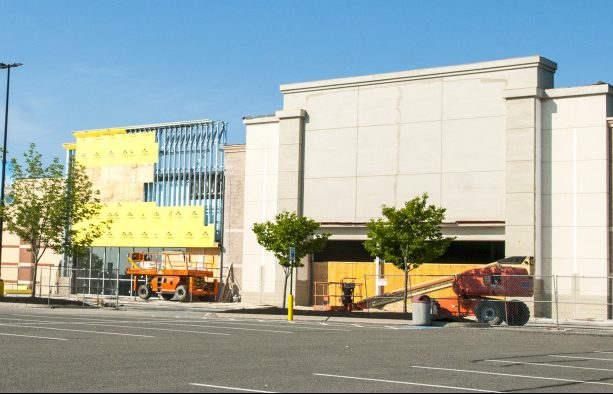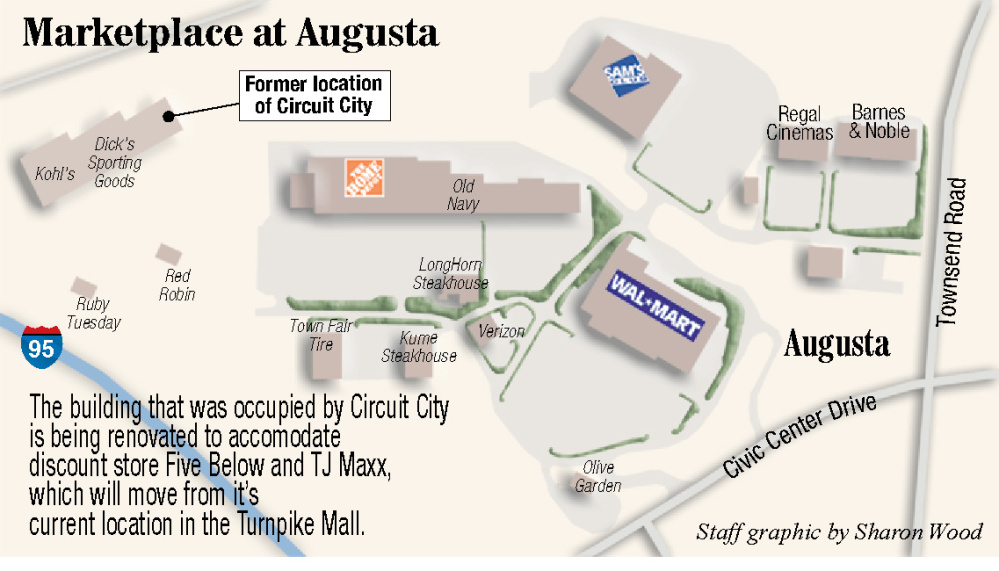AUGUSTA — Over the past week or so, blue signs have cropped up along Civic Center Drive proclaiming that Five Below is opening soon at the Marketplace at Augusta.
The Philadelphia-based retail chain, which opened 31 stores nationwide from February to April, is bringing is second store in the state to central Maine a little later this year. It’s moving into space formerly occupied by Circuit City.
While its trendy merchandise and target market of teens and preteens differentiates it from other retail chains such as Dollar General, Dollar Tree and Family Dollar, which are expanding their territory in Maine, all of those companies share a couple of important traits: their merchandise is bargain-priced and their companies are growing at a time when long-established retailers are shrinking their footprints and closing stores or filing for bankruptcy.
These shifts are the result of changing consumer behavior, influenced by the internet and the convenience of e-commerce, economists say, but other factors are shaping how people in central Maine are shopping now.
Fifty years ago, department stores were the anchors of downtowns of even small cities.
“In Portland, Porteous and Benoit’s, these were important stores in southern Maine,” said David Findlay, the Pugh Family Professor of Economics at Colby College in Waterville. “They drew in significant business.”
But when the Maine Mall opened in South Portland, it drew business from the city to the suburbs.
“Where the dollars were spent physically changed,” Findlay said. “Now it’s (also) a physical change, but it’s electronic.”
People are using the internet to buy goods and bypassing what for decades were iconic shopping establishments such as Sears, which closed its Augusta store earlier this year, and Macy’s, he said.
Bon-Ton, which opened at the Maine Mall four years ago, is closing this month. And J.C. Penney announced plans earlier this year to close its Rockland store.
While retailers such as Amazon are claiming a large share of online business, customers in rural areas are looking at different shopping options, and it’s the growing sector of what are sometimes called “small box” stores.
These are small-format stores offering an inexpensive range of products, often but not always located away from retail centers.
“These stores are filling what they perceive to be a niche, or a market not being met by others,” Findlay said.
“They are not opening them randomly, so they must view there is some sort of market for the goods they are selling and the price and convenience,” he said.
For Dollar General, which has 32 locations across Maine including stores in Augusta, Manchester, Litchfield and Oakland, the goal is to choose locations where it can serve customers within about a 5-mile radius or a 10-minute drive.
Company spokeswoman Laura Somerville said the company looks for places it can offer customers an easy and convenient shopping choice.
“When placing a store, we take demographic trends, competitive factors, traffic patterns and community concerns into consideration,” Somerville said.
It’s working. Publicly traded companies such as Dollar General regularly report their company’s results. Industry watchers say total dollar store sales increased about 50 percent from 2010 to 2015, from $30.4 billion to $45.3 billion.
That market, Sheena Bunnell said, is made up of people, particularly in rural areas, who are choosing to shop at stores in their own towns rather than traveling to retail centers for a range of reasons including spending less on travel.
“They want a shopping experience,” said Bunnell, who is professor of business economics at the University of Maine at Farmington. “They want to meet their budgets and get a decent price for a decent product.”
Frugal shoppers who want to stretch their money also want the gratification of a shopping outing, she said.
“If you can spend $15 and walk out with two bags filled with a lot of items, shoppers are happy about that experience,” she said.
Everything at Five Below is priced between $1 and $5, from its fidget spinners and backpacks to fitness balls to its smartphone accessories and clothing. But in its case, Dana Zuppo, marketing manager at Five Below, said after the company opened its South Portland store in 2014, it looked north to the Augusta-area retail market.
While central Maine is more rural than southern Maine, the draw of Augusta was its status as a retail center.
“We like the strong collection of national retail that this market has, which gives it its large regional drawing power,” Zuppo said.
Jessica Lowell — 621-5632
Twitter: @JLowellKJ
Send questions/comments to the editors.



